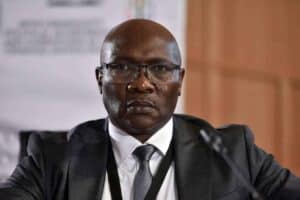Deputy National Commissioner for Crime Detection Lieutenant General Hilda Senthumule gave her evidence to the Madlanga commission on Friday.

The transferring of Political Killings Task Team (PKTT) dockets between KwaZulu-Natal and Gauteng is a key dispute that may have set off a chain reaction.
The Madlanga Commission of Inquiry on Friday heard more evidence about Deputy National Commissioner General Shadrack Sibiya’s coordination of the disbandment of the PKTT.
Deputy National Commissioner for Crime Detection Lieutenant General Hilda Senthumule, a direct subordinate of Sibiya’s, presented her evidence before the commission.
‘A political decision’
Senthumule stated how when she returned to work in January, she was told by Head of Crime Intelligence General Dumisani Khumalo that all PKTT dockets needed to be sent to Sibiya’s unit.
Under the instruction of Police Minister Senzo Mchunu, part of the disbandment plan involved returning dockets to individual stations and having provincial commissioners decide on the reassignment of task team members.
Senthumule said that as of 6 March, 114 dockets that were still before the court were to remain with the PKTT, but this changed at a later meeting involving the minister.
A progress presentation was given to Sibiya and the minister in late March, with Mchunu questioning the numbers given, noting that four dockets had since changed status to court-ready.
A debate over the feasibility of transferring court-ready dockets ensued, with Senthumule telling the commission that Sibiya intended to establish a new central team to oversee the investigations.
“The minister also made the comment to say this is a political decision and the president is in the know of that decision. That is what he said in that particular meeting.
“[Mchun] ended that meeting by saying he won’t engage with us anymore, and he will only engage with the national commissioner,” said Senthumule.
Mkhwanazi unaware of docket transfer
She said her relationship with Sibiya was cordial, but when she protested the transfer of court-ready dockets, Sibiya reprimanded her for upsetting the minister and instructed her to conclude the handover.
She stated that Khumalo, following the directive, brought the dockets to Pretoria, where they were audited, explaining that they were due back in KwaZulu-Natal (KZN) by the end of April.
Senthumule highlighted that only stations conduct docket audits, not the head office in Pretoria.
On 24 April, Senthumule contacted KZN police commissioner Lieutenant Nhlanhla Mkhwanazi to confirm the documents were ready to be sent back, but he reacted sternly.
Mkhwanazi explained to Senthumule that he was unaware of how the dockets arrived in Pretoria and that he was not told of any disbandment.
Senthumule said Mkhwanazi’s instruction to her was, “If you bring the dockets, know this, I won’t be responsible for them”.
She explained that a provincial commissioner was responsible for all dockets, and if Mkhwanazi refused, she would have no choice but to delay the transfer.
When asked what she should do with them, Mkhwanazi told her, “Your boss should decide what to do with those dockets,” referring to Sibiya.
Investigations could be hampered
Senthumule said the matter of the court-ready dockets is what likely stalled the disbandment, and her acting on the directive.
Senthumule was adamant that the disbandment would lead to new investigating officers assuming the investigations at the station level, creating disruptions to witnesses and victims.
“The decisions we make have far-reaching implications. The processes being hastened did not help the process.
“We had to make actions as we moved along. So, I do agree with you, we do owe this nation an apology,” said Senthumule.
She explained that taking the dockets back to station level would have also drastically changed the way they were investigated, a manner unsuitable to their importance.
“In dealing with your organised murders, or hit murders, you don’t require conventional policing or investigation methods. You need to go unconventional.
“I don’t think it would have received the same attention or resources that were within the PKTT,” said Senthumule.
NOW READ: ‘Madlanga commission can be reset police service needs,’ says Cachalia






